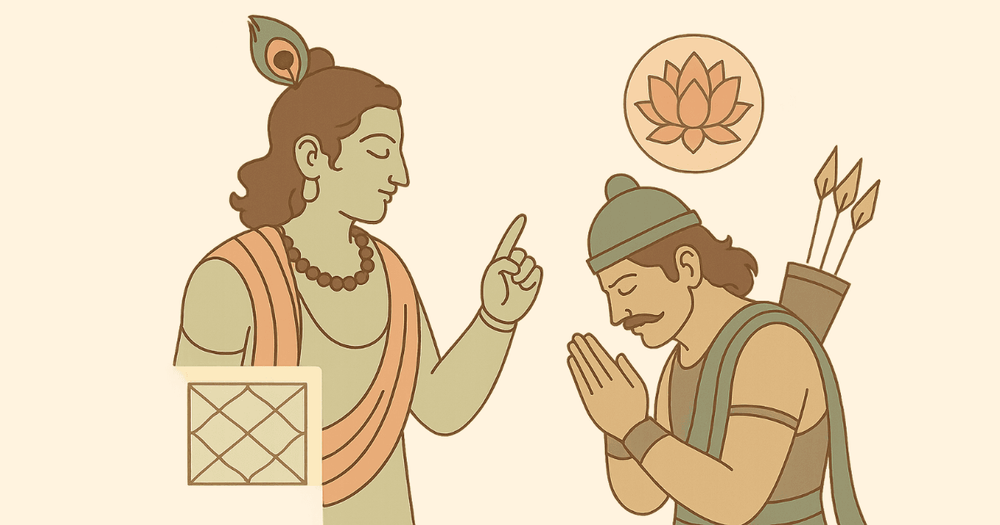How to Stop Overthinking and Trust the Process: The Bhagavad Gita, Vedas, Ramayana, Mahabharata Approach
By Aparna Patni
Reflection, Surrender, Story and Mindfulness for Peace

Table of Contents
Everyone experiences moments where recurring thoughts and anxieties seem endless. We question: Am I doing right? Did I offend that person? What if things go wrong? This cycle never ends. But the Vedas, Gita, Ramayana, Mahabharata and the Puranas all teach that those obsessed with controlling outcomes never find true peace.
Who Is in Control? Are We Responsible for Everything?
The Gita and Mahabharata: Arjuna’s Fear and Krishna’s Teaching
On the battlefield, Arjuna’s doubts overwhelm him. Krishna says, “You have the right to work but not to the results.” (Gita 2.47) Outcomes, destiny and the world itself rely on a greater order.
Bhishma lived by vows but fate still played differently than he wished. Gandhari’s effort for her sons did not guarantee their success.
| Character / Episode | State of Mind / Overthinking | What They Learned |
|---|---|---|
| Arjuna | Hesitation, repetitive doubt | Detachment, Krishna’s wisdom |
| Bhishma | Planning, anxiety | Acceptance, renunciation |
| Gandhari | Hope for her sons | Control is ultimately an illusion |
| Rama | Love, responsibility, loss | Surrender, humility before fate |
| Hanuman | Worry, obstacles, outcome | Devotion, focus without fixation on outcome |
Mind: Tool or Master? Epic Lessons
In Gita 6, Arjuna says, “Mind is turbulent, hard to conquer.” Krishna recommends mastery, not enslavement.
In the Ramayana, Kaikeyi’s inner confusion led to disaster. In Mahabharata, Dhritarashtra let habitual doubt spoil happiness and kingdom alike.
The Vedas discuss meditation as an answer: “Manah pavanasamanah”-The mind is like the wind, tamed through steady discipline.
Detachment: Release, Not Defeat
Detachment is not indifference or withdrawal. It means acting with clarity, letting results fall where they may.
Hanuman traversed Lanka’s dangers without obsessing about results. Bhishma stood for his vows but released his will at the end. Bharata gave up the throne, offering it to Rama’s sandals.
Live in the Present: Purana and Epic Teaching
The Gita urges: “Feel no sorrow for the past, nor anxiety for the future. Stay in the present.”
Nachiketa braved worries of death and future to focus on truth with Yama. Sati made her present into spiritual resolve, not defeat. Draupadi transformed shame into resilience, focusing not on revenge but on faith.
Surrender Is Strength: Lessons from Ram, Krishna and Shiva
Surrender does not mean weakness or defeat. “Abandon all duties and surrender to Me,” says Krishna.
Shiva drank poison for the world, unconcerned with outcome. Rama accepted exile and fulfilled his role with trust. Krishna left results to destiny.
| Teaching Story | Challenge / Fear / Doubt | What Was Gained / Realized |
|---|---|---|
| Sita (Ramayana) | Shame, separation, vilification | Endurance, power, spiritual liberation |
| Draupadi (Mahabharata) | Insult, revenge desires | Faith, transformation, trust in Krishna |
| Sati (Puranas) | Rejection, familial opposition | Resurrection, dignity, cosmic approval |
| Prahlada (Bhagavatam) | Persecution, loneliness | Devotion, victory over adversity |
FAQs (Based on Stories, Vedas, Mindfulness)
1. Does active thinking always provide solutions?
No. Deep peace and clarity come from meditation, surrender and meaningful work.
2. Is detachment just non-involvement?
Not at all. It is passionate action grounded in wisdom and self-acceptance.
3. What is the greatest epic about process and presence?
Nachiketa and Yama’s dialogue, Rama’s exile, Draupadi’s trials-all trusted the process.
4. How does one discipline the mind?
With devotion, routine, story and Gita-inspired practice.
5. Which Gita verse best voices trust in process and release from overthinking?
“Karmanye vadhikaraste ma phaleshu kadachana”- act but let go of results.
Ongoing Effort, Practice and the Gita’s Greatest Lesson
Rama, Krishna, Sita, Arjuna, Draupadi and Bhishma all learned trust in process, time and self-discipline. This is what the Gita and the greatest epics offer-a way above worry, into action and mindful presence. That is where peace and fulfillment reside.
Get your accurate Kundali
Generate KundaliDid you like it?
Author
Aparna Patni (40)
Experience: 15
Consults About: Family Matters, Muhurat
Clients In: MP, DL
Share this article with friends and family